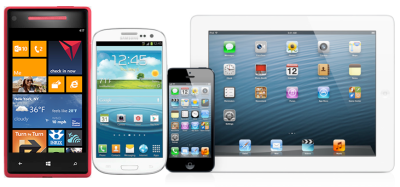 A Rush to Marketplace
A Rush to Marketplace
The mobile ecosystem has never been so rich with diversity. With a combination of hardware, software and services, a mobile device in your hands today provides a great deal more than any PC (personal computer)
you have ever bought. This is why it is the target of software vendors such as Microsoft, Apple, Google and lots more, each providing their own solution to the mobile environment. With such a rush to mobile devices, tech leaders around silicon valley and the world has claimed the future to be mobile. To support these new mobile
platforms, cloud services/software have been developed with the call to developers world wide to step up to the challenge.
App stores have sprung up from each major provider which supplies users with free and paid for applications for their phones. These apps vary from games to business software and provide entertainment as well as keep
businesses moving (literally). Every desktop application and web service from office suits to web services are moving to mobile. With mobile devices surpassing PC’s, more people are being connected with each other and
their favorite services.
Software + Services = People
The mobile device as a consumer product has grown throughout the years. In the 90’s, it was all about the network and communication companies who fought over users. Now communication companies are a piece of the pie, which now includes software and web service companies around the world. This was solidified with Facebook’s
entry into the mobile phone business with Facebook Home, a tighter integration of Facebook into the android platform and a partnership with mobile producer HTC and Samsung to create new devices.
Facebook’s integration isn’t a new fork of the android platform (although tech pundits thinks it’s a start), but a customization of the android phone itself with a new home screen and an app launcher interface. Facebook
Home will put updates from the social network right on the home screen via a feature called Cover Feed. Facebook says Home will be available only for certain specific phones at launch, and a tablet version will come at a later date.
Facebook entry may not be a big deal as a mobile platform change, but Facebook has over 1 billion users world wide and if the mobile projections are right then it has to be there.
The Platform Wars
With major software vendors competing with each other like never before, Google, Apple and Microsoft are viciously fighting for market share in the mobile space.
Microsoft being the last to enter the space in the three, has not let that slowed them down in getting the numbers up. Microsoft has modified its Windows Azure cloud service for mobile and tablet devices and has finally
moved its office suit (Office 365) to the cloud in the effort to carry over desktop users to web and mobile. Microsoft has tons of money and when they get their sights on something they spend to get it, but consumers are more tech savvy and fancy commercials and marketing blitz won’t sway them. But being the software giant that
Microsoft is, you can bet that all their traditional software packages will eventually make it to mobile devices in someway so Microsoft loyals will follow.
Apple the pioneer in the smart phone market can’t seem to do wrong. iPhones have sold out version after version from conception and they are a market leader. It certainly seems that everyone is developing for the
iOS platform so Apple has a serious stack (hardware and software). But there’s one thing missing from that stack, services.
Apple has tried bundling apps with services to its iPhones but they have not panned out. For each app/service Apple has, there are much better ones out there, Apple just can’t seem to produce a solid package and need
help for others.
Introducing Google, the master of cloud services. Starting with search, Google has gone into maps, mail, office and productivity suits and lots more. Google has made them selves a major software vendor with companies like Microsoft looking on. The approach that Google has taking isn’t the traditional PC approach but from the cloud.
The cloud connects people to software/services in record numbers that PC’s could never have and with the android platform the have a winning thing. Cloud services in a post PC era means any device can connect and so the traditional PC is down graded back to an office tool. I for one can’t be without my android phone, and most of my
cloud services is from Google. This mobile freedom is shared by many and it’s a reason why small businesses are moving at great pace.
With so many choices out there and cheaper smart phones being develop every day, who will win. Will there be a clear winner? Well here is my thought, for decades Microsoft, Apple, and the Open Source Movement (Linux) has been fighting an OS (Operating System) war that still exist today. So should there be a winner?
Fabian Glace is developer who lives and works from St Lucia

 eCommerce1 year ago
eCommerce1 year ago